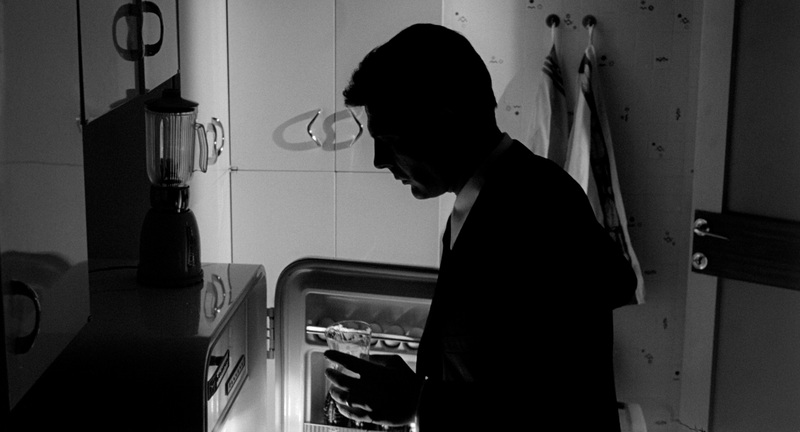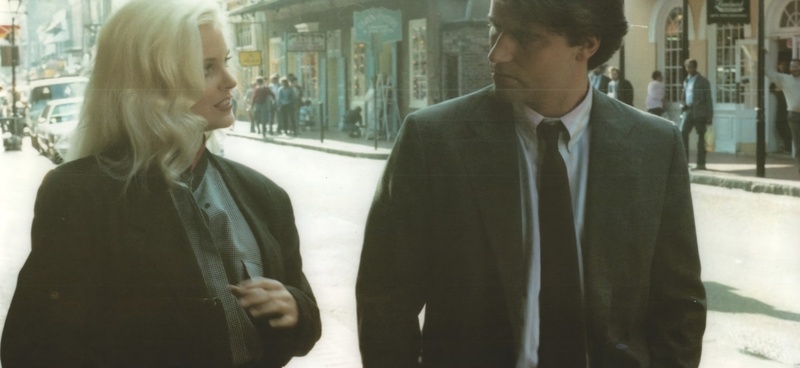
What Two People Won’t Say Out Loud
MOVIE REVIEW
La Notte
–
Genre: Drama, Psychological Drama, Romance
Year Released: 1961, Eureka Entertainment 4K 2025
Runtime: 2h 2m
Director(s): Michelangelo Antonioni
Writer(s): Michelangelo Antonioni, Ennio Flaiano, Tonino Guerra
Cast: Marcello Mastroianni, Jeanne Moreau, Monica Vitti
Where to Watch: available now, order your copy here: www.eurekavideo.co.uk
RAVING REVIEW: Michelangelo Antonioni’s LA NOTTE doesn’t rush to introduce conflict or carve emotion into neat, digestible pieces. Instead, it begins with an unnerving quiet — the kind that seeps into a relationship long before anyone is willing to name it. The film exists in that liminal space where two people remain tethered by routine but long detached from anything that resembles intimacy. What begins as a visit to a dying friend becomes a slow unraveling, the kind that doesn’t snap but frays strand by strand until there’s almost nothing left to hold.
The strength of LA NOTTE lies in how Antonioni understands the exhaustion that settles into a marriage when the words dry up. Giovanni and Lidia aren’t dramatic in their disconnection; they’re drained. This isn’t a couple fighting to save something. It’s two people wandering through the same day with a shared history behind them and no shared future in sight. That gentle, resigned tone keeps the film grounded, refusing the temptation to make its rupture explosive or theatrical. You feel the fatigue simmering beneath their conversations, the way both characters choose small moments of silence over larger confrontations simply because they have nothing new to say.
Marcello Mastroianni’s Giovanni carries himself like a man drifting through his own success. He’s respected, celebrated, and noticeably unmoved by all of it. Watching him endure the obligations of fame — signings, parties, flattery — is watching someone realize that the identity he built no longer reflects anything he feels. Jeanne Moreau’s Lidia, meanwhile, expresses her despair not through big gestures but through subtle details: her wandering, her stillness, her reluctance to engage with the social world that constantly pulls Giovanni into its orbit. She’s present, yet consistently unseen, and that truth quietly forms the emotional backbone of the film.
Antonioni uses Milan as more than a backdrop; the city becomes a mirror. The cold elegance of modern architecture, the sprawling alienation of upper-class gatherings, the sterile social spaces where everyone performs the version of themselves others expect — it all wraps around the couple like an emotional echo. Their marriage feels swallowed by the environment, as if every sleek building and crowded party reinforces just how isolated they’ve become from one another. The city doesn’t offer escape or clarity. It amplifies the emptiness.
There’s a fascinating tension in the film’s pacing — not slow for the sake of slowness, but deliberate in its mimicry of emotional stagnation. Antonioni wants you to sit with these characters, to feel the weight of their distancing, to recognize the patterns of two people moving parallel rather than together. But amidst that melancholy, the film never feels punishing. There’s beauty in the quiet observation, in recognizing how gently relationships fall apart. Nothing here is melodramatic, yet everything feels significant.
The third-act shift into the wealthy industrialist’s nighttime celebration opens an entirely new dimension of the film. The party is loud, vibrant, and filled with people who mistake stimulation for fulfillment. It’s a world Giovanni slips into effortlessly while Lidia moves through it like a ghost. Monica Vitti enters the film here, and even in a supporting role, she transforms the emotional dynamic. Her presence is exactly what the couple’s marriage lacks: curiosity, openness, and a spark that hasn’t been crushed by years. She doesn’t steal the film, but she clarifies it. Watching how easily Giovanni gravitates toward her — and how quietly Lidia watches from the edges — anchors the emotional clarity Antonioni has been slowly building.
What holds the film together is its honesty about the death of emotional connection. LA NOTTE doesn’t pretend that love always ends loudly. Sometimes it ends with a sigh. Sometimes it ends in the middle of a crowded party. Sometimes it ends because people change in ways they don’t know how to explain. The beauty here lies in the refusal to romanticize heartbreak. Antonioni understands that the hardest endings are the ones without a defining moment — the ones that feel like they’ve been happening for years.
A film that rewards patience, thought, and emotional investment. Not flawless, but undeniably important. Its impact doesn’t come from plot, but from atmosphere and truth. It’s the kind of film that lingers for hours afterward, not because of what happened, but because of what didn’t — all the conversations left unsaid, all the affection left unexpressed, all the choices made simply by not choosing anything at all. I personally prefer his 1966 masterpiece BLOW-UP to this in pretty much every way, but that doesn’t diminish the importance here.
LA NOTTE remains one of Antonioni’s most human works, not because it’s sentimental but because it refuses to be. It’s a portrait of two people facing the end of something they once believed would last forever, and the quiet devastation of admitting that nothing — not love, not connection, not even identity — is safe from erosion. The film captures that truth with an honesty that doesn’t soften the blow, and it is this honesty that makes it continue to resonate decades later.
Please visit https://linktr.ee/overlyhonestr for more reviews.
You can follow me on Letterboxd, Instagram, Twitter, and YouTube. My social media accounts can also be found on most platforms by searching for 'Overly Honest Reviews'.
I’m always happy to hear from my readers; please don't hesitate to say hello or send me any questions about movies.
[photo courtesy of EUREKA ENTERTAINMENT]
DISCLAIMER:
At Overly Honest Movie Reviews, we value honesty and transparency. Occasionally, we receive complimentary items for review, including DVDs, Blu-rays, CDs, Vinyl Records, Books, and more. We assure you that these arrangements do not influence our reviews, as we are committed to providing unbiased and sincere evaluations. We aim to help you make informed entertainment choices regardless of our relationship with distributors or producers.
Amazon Affiliate Links:
Additionally, this site contains Amazon affiliate links. If you purchase through these links, we may receive a commission. This affiliate arrangement does not affect our commitment to honest reviews and helps support our site. We appreciate your trust and support as you navigate these links.



Average Rating